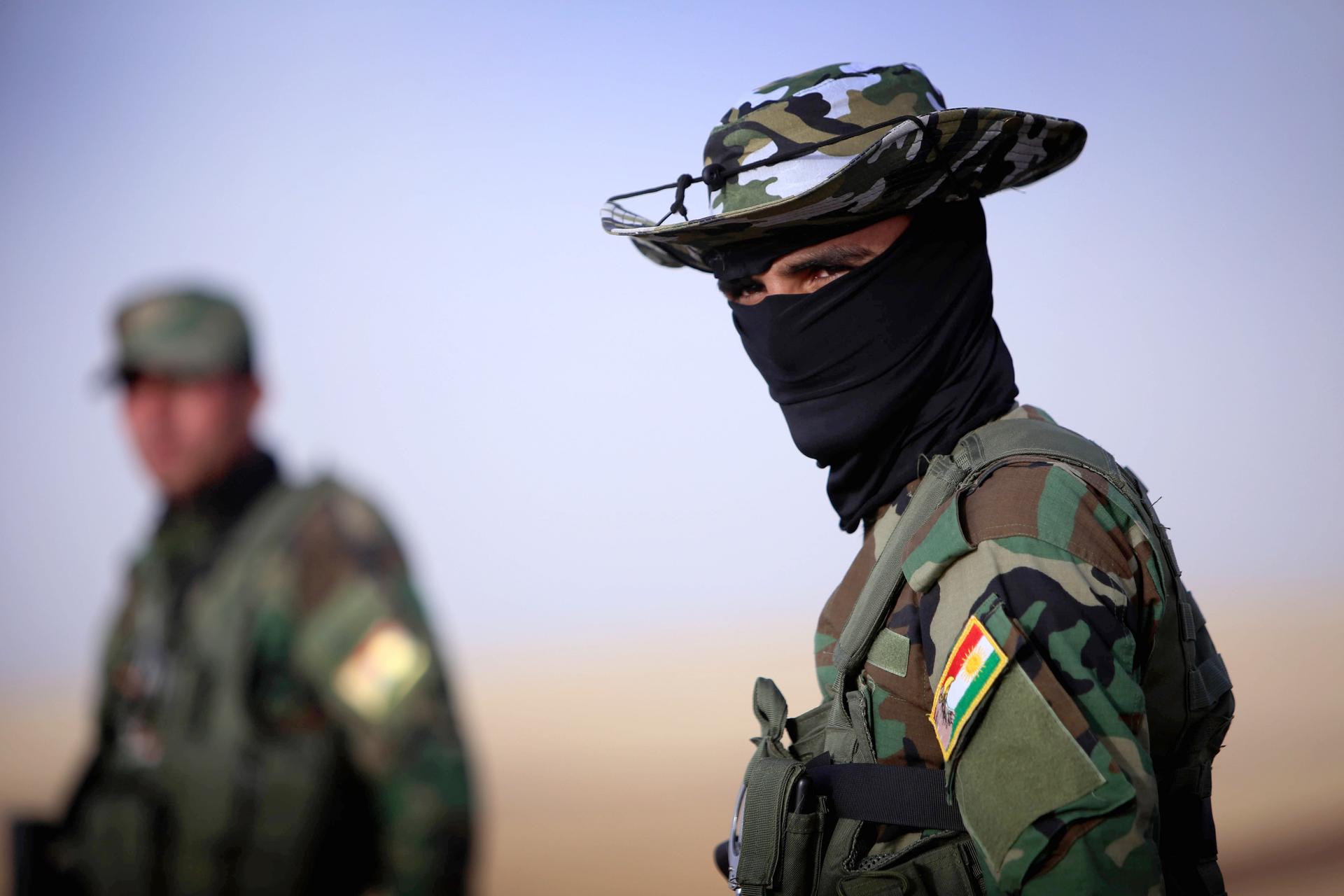Day 1,183: In Syria and Iraq, all eyes turn to the Kurds
An Iraqi Kurdish security guard (Peshmerger) stands guard as Iraqi families fleeing violence in the northern Nineveh province gather at a Kurdish checkpoint in Aski Kalak.
Today is Day 1,183 of the Syria conflict.
Coverage from Syria has slowed down as journalists and photographers throughout the Middle East get re-routed to Iraq. The Iraq-Syria cross-border jihadist group, whose name is translated alternately as the Islamic State of Iraq and the Levant (ISIL) or the Islamic State of Iraq and Greater Syria (ISIS) is in its second day of a flash offensive in which it has captured vast swaths of Iraq, adding to territory gained in Syria in previous weeks.
The Iraqi military has crumbled before the ISIL advance, and the jihadists have reportedly captured multiple US military vehicles and driven them back over the border into Syria. Photos have also surfaced on Twitter claiming to show the group demolishing the earth-barriers previously erected on the Iraq-Syria border — both a tactical move to transport the vehicles and, as journalists on Twitter are perceiving it, a symbolic move for a group that aims to establish a borderless caliphate where two countries now stand.
History has a cruel sense of irony. All eyes in Iraq and Syria now turn to a people both countries have at various points sought to stifle: the Kurds. The Kurdish population in Syria has long been fighting against ISIL in the north. And as Iraq's army literally drops its pants and flees the advancing jihadists, the Peshmerga fighters of Iraq's Kurdistan Regional Government are stepping in.
Even before the recent events, Kurdish fighters in both Iraq and Syria had a long history as the darlings of Western media, due to, as Amberin Zaman recently pointed out for Al Monitor, their "overtures to minorities … and their policy of empowering women (about a third of the YPG's fighting force is female)." (The YPG is the Kurdish militia in northeastern Syria, on the border with Turkey.)
Now, in the wake of the embarrassing routing of the US-trained Iraqi troops, the Peshmerga of Iraqi Kurdistan are taking on impossibly romantic proportions in Western eyes, and the writeups are starting to look like they've been cribbed from Tolkien's descriptions of elvish battalions. "Thousands of men from the KRG's well-trained Peshmerga — which means 'those who face death' — were deployed around the southern border of the Kurdish autonomous enclave," read a Wall Street Journal piece yesterday evening:
"They included two brigades in Tuz Khurmatu, close to the disputed oil city of Kirkuk. Peshmerga units, which the KRG says are 190,000-strong, also set up checkpoints along the road to Mosul to regulate the flow of refugees and guard against militant attacks or infiltration.
"The Peshmerga forces are committed to protecting the security and stability of Kurdistan," said Safeen Dizayee, spokesman for the regional government in northern Iraq. The Kurdistan Communities Union offered to assist Iraqi Kurds in warding off ISIS: "The guerrillas of Kurdistan are ready for the defense and security of Kurdistan," it said.
In the wake of ISIS's routing of Iraqi army units in recent days, researchers and military officials said Kurdish fighters represent the best-equipped force to form a bulwark against a rapidly expanding Sunni militant threat.
The Peshmerga have previously stepped in to help protect Mosul from insurgents. The units have also helped ensure a decade of relative stability and prosperity for the Kurdish Iraqi enclave in contrast with the violence in the rest country."
But the facts are not embellished: Everyone's looking to the Kurdish forces because, well, they seem to be the only ones left. Not only has Iraq's army turned in a poor showing, but, as former UN special envoy to Syria Lakhdar Brahimi noted in an interview with Der Spiegel on Sunday, there is some speculation that Assad's forces in Syria may have refrained from attacking ISIL in order to prove a point: to make ISIL the only alternative to Assad, and let that fact scare Syrians and the West into submission. In fact, following ISIL's gains in Iraq Assad smugly announced that "the United States and the West have started to send signs of change. Terrorism is now on their soil." (Also, as has been pointed out in multiple publications recently, the Assad regime is actually buying oil from ISIL, which has seized control of a number of key refineries.)
In other words, right now ISIL's biggest barriers to dominance in Iraq and Syria are not the national armies of these two countries. Instead, you've got the other jihadist groups jockeying for power, such as Al Nusra, which split with ISIL back in February — and then you've got the Kurds.
The conflict continues.
The article you just read is free because dedicated readers and listeners like you chose to support our nonprofit newsroom. Our team works tirelessly to ensure you hear the latest in international, human-centered reporting every weekday. But our work would not be possible without you. We need your help.
Make a gift today to help us reach our $25,000 goal and keep The World going strong. Every gift will get us one step closer.
